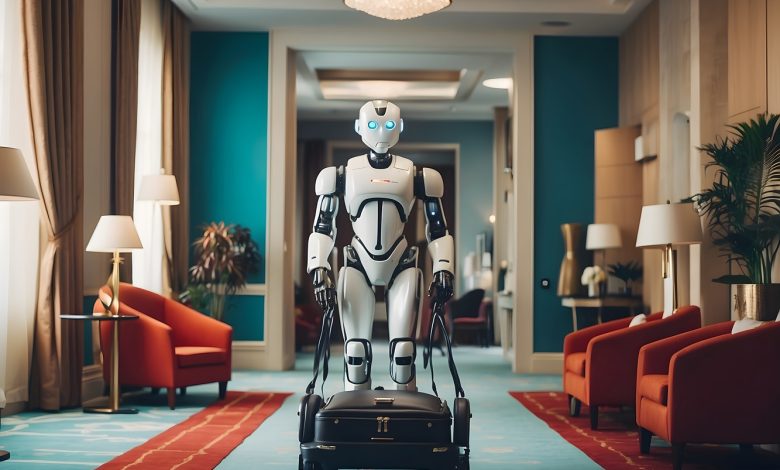
Exclusive Op-Ed: Are customer service roles at risk of being extinct?
Thought leader Jaquie Scammell says: "It’s hard to imagine what the future of hospitality may look like, because AI and technology will offer so many possibilities."
According to the World Economic Forum’s report The Future of Jobs 2020, automation may displace 85 million jobs by 2025. How many of hospitality’s customer service roles will be swept up in this statistic?
This is one of many questions being asked by leaders and owners of hospitality businesses as they navigate this fast-changing digital era.
Read the summer print edition of AccomNews HERE
In all revolutions, certain jobs go away, and new jobs are created:
- Lamplighters used to go around and light the gas streetlamps at dusk, but once we brought in electric streetlamps, that job was unnecessary.
- Switchboard operators are no longer needed, with manual telephone switchboards mostly phased out.
- Bank tellers were replaced by Automated Teller Machines (ATMs).
- Checkout staff are slowly being replaced by self-checkout technology and online purchasing.
Now imagine a future world in the hospitality industry:
- Bartenders used to entice customers with a fine wine or cocktail, but have been replaced by premixed-drink-dispensing machines.
- Restaurant hosts used to smile, greet customers and walk them to their tables, and then keep an eye on clearing their tables, but have been replaced by robots that greet people, seat them and clear their tables.
- Baristas used to offer up casual banter and bring some extra flavour to customers’ everyday coffee routines; they’ve been replaced by push-button automated machines.
- Friendly customer service attendants would run through the specials of the day and tempt the customer with some personal recommendations; they’ve been replaced by QR codes and automatic ordering systems. A tip is still asked for, despite the automated service.
It sounds scary… But wait, it also sounds a lot like what we’re already experiencing right now, in places.
Customer service roles are at risk of extinction. Why?
<ChatGPT has entered the chat.>
ChatGPT is the fastest-growing app in human history, and generative AI is changing humans and how we serve each other. It hugely reduces our need to think critically and creatively, problem-solve, and apply emotional reasoning to our responses and written replies.
In episode 367 of the Lex Fridman Podcast (25 March 2023), Sam Altman, the CEO of OpenAI (the company behind ChatGPT), said that the category of jobs that will be impacted the most by ChatGPT is customer service. He believes there’ll be way fewer jobs relatively soon, particularly in call centres and frontline services, because ChatGPT and GPT-4 language models will become better at these jobs than human beings – and ten times more productive.
When I listen to clever people like Sam Altman talk about the future, I think that perhaps it’s hard to imagine what the future of hospitality may look like, because AI and technology will offer so many possibilities. Possibilities that neither you or I have even thought about yet, and that will most definitely threaten the human customer-service role.
Especially given the complexities that the hospitality industry presents. For hospitality business owners and leaders, having humans in customer service roles is a large cost to the business. Meeting service ratios, paying penalty rates and dealing with staff turnover add to the pressure.
For customers, expectations around speed, accuracy and friendliness of service in hospitality have never been higher–yet confidence that these heightened expectations will be met is lower.
Planning to prevent extinction
When a species is at risk of becoming extinct, usually there are a group of environmental scientists and preservation specialists who immediately plan a campaign to drive awareness towards helping keep that species alive. The obvious place to begin is to make it known how the species is crucial to the balance of the environment and the whole ecosystem. It’s a worthwhile exercise to consider all the benefits of keeping customer service roles in the workplace mix.
Customer service roles are crucial to humanity
There are people all over the planet with a palpable need for connection, meaning and significance. The consequences of not having this human connection, even in the most ordinary touchpoints of a day, are startling. The US Centers for Disease Control and Prevention (CDC) published a report that says social isolation increases a person’s risk of premature death at a rate that rivals smoking, obesity and physical inactivity.
Connection may be one of life’s most important aspects; and serving people is a direct vehicle for it, especially if the server is able to offer the spirit of hospitality while doing so.
Jaquie Scammell is the award-winning author of The Future of Service is 5D, Service Habits (2nd ed) and Service Mindset. She’s an eminent keynote speaker, a thought leader in the field of service leadership and the CEO and founder of ServiceQ – a business which partners with organisations to reimagine their service culture and develop conscious service leaders, engaged employees and loyal customers. Find out more at www.serviceq.co.






